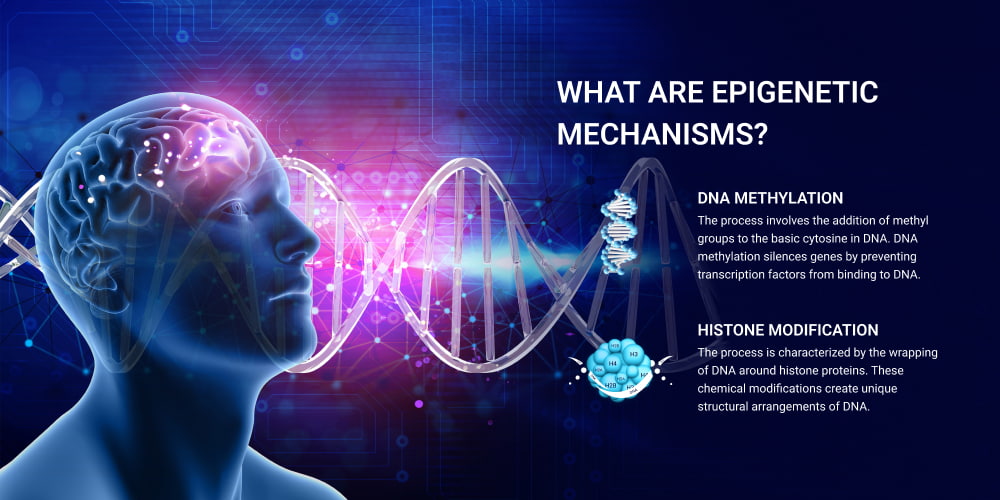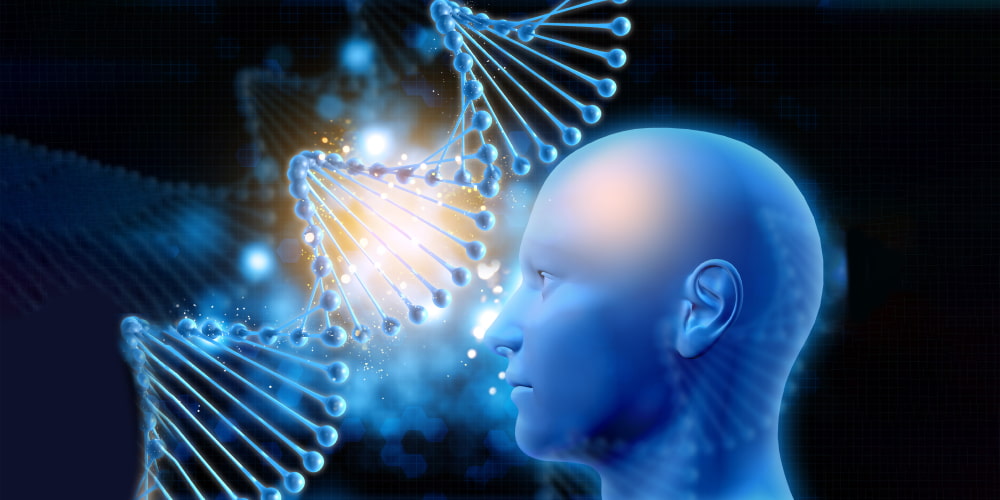In medicine and research, understanding genetic mutations is essential. Research helps doctors better understand specific aspects of a patient’s condition. Epigenetics has revolutionized our understanding of how genes interact with the environment. Unlike traditional mutations, epigenetic mechanisms regulate genes without changing the genetic code. Memory formation and cognitive functions depend on epigenetics. Our brain is constantly experiencing gene expression and regulation.
Many neurological disorders are linked to changes in epigenetic patterns. During periods of neurological instability, a person is at risk of developing various conditions. It all starts with depression and anxiety and progresses to neurodegenerative diseases. An integral part of human health is influenced by the environment. Environmental factors are one of the main factors that affect the epigenome. Proper nutrition and diet help improve overall health. Avoiding stress and regular physical activity are beneficial. Toxins and air pollution can also trigger the onset of neurological conditions.
What Are Epigenetic Mechanisms and How Do They Affect Brain Function?
People experiencing psychological and neurological conditions should seek professional medical care. Healthcare specialists can provide treatment options for neurological disorders. Epigenetics is involved in gene expression that does not change the DNA base. Instead of changing the genetic code, the mechanism acts like a special switch. It can turn genes on or off in response to the environment. These epigenetic mechanisms are crucial for brain development, memory, and overall mental health, while their dysregulation can lead to serious degenerative diseases. Here is how epigenetics affects gene expression and its critical importance:
- DNA methylation. The process involves the addition of methyl groups to the basic cytosine in DNA. DNA methylation silences genes by preventing transcription factors from binding to DNA. This mechanism regulates neural differentiation and plasticity. DNA methylation is a necessary process for the formation of memory in humans. This mechanism enables us to form and retain new memories throughout our lives. Epigenetic mechanisms are essential, and their disruption is associated with cognitive decline.
- Histone modification. The process is characterized by the wrapping of DNA around histone proteins. These chemical modifications create unique structural arrangements of DNA. This process affects both how DNA is packaged and its accessibility. Acetylation of histones helps to enable gene expression. The process is essential for learning and assimilation of information during memory. Their primary function is to inhibit or activate specific genes.
Disruption of epigenetic regulation affects genes and brain health. Genes can become overactive or inappropriately suppressed, contributing to various diseases. As a result, a person may develop neurodevelopmental disorders that can progress to more serious conditions. A vivid example of epigenetic dysregulation is Alzheimer’s disease. A person may also face schizophrenia or severe depression. Epigenetic mechanisms are essential for ensuring the connection between genetics and the environment. Through these mechanisms, the brain can adapt to different types of stress and lifestyle factors.
How Epigenetic Changes Impact Gene Expression in Neurological Disorders
Our understanding of how epigenetics impacts neurological diseases continues to evolve. Everyone deserves access to treatment when facing health challenges. Epigenetic modifications are essential for gene regulation. They ensure that some genes can be turned on or off as needed. When these regulatory processes are disrupted, they can contribute to the development of neurodegenerative diseases. Epigenetic modifications play a key role in gene expression. Here’s what happens when these vital processes are disrupted:
- Alzheimer’s disease. During this disease, the DNA methylation patterns of the brain undergo significant changes. There are changes in genes that play a key role in plasticity. Certain proteins produced in the brain can impair neuronal survival. A person loses memory, and cognitive abilities decrease. Epigenetic changes lead to severe conditions and memory loss.
- Parkinson’s disease. Parkinson’s disease is characterized by the loss of some dopamine-producing neurons in the brain. Neurodevelopmental diseases lead to deterioration in overall brain function. Disruption of the process leads to tremors in humans and cognitive decline. Another problem is motor dysfunction and the inability to control movements.
- Schizophrenia. During this disease, some aspects of the regulatory genes are disrupted. Specific microRNAs abnormally suppress genes involved in dopamine production. As a result, a person may experience hallucinations, cognitive impairment, and emotional instability. Normal regulation of gene expression becomes severely disrupted, worsening many symptoms.
The Role of Environmental Factors in Shaping Epigenetic Changes in the Brain
Environmental factors significantly influence epigenetic changes. Modifications occur that regulate gene expression in the human brain. Diet, stress, and exposure to toxins have a strong influence on the modification. These environmental factors can disrupt microRNA activity and impair neurodevelopment. Understanding the interaction between genes and environment is critical for preventing and treating mental disorders. Here are the main environmental factors, their characteristics and their impact on epigenetic changes:
- Stress. Stress on a regular basis causes epigenetic changes in genes. There is a violation of the control of the body’s response to various factors. These changes can cause the body to develop heightened reactions to stress. As a result, a person constantly feels nervous and anxious. Over time, they may experience persistent depression and post-traumatic stress disorder.
- Diet. Environmental factors have a significant impact on the human body and health. Essential nutrients such as B vitamins and omega-3 fatty acids are particularly beneficial. They have a positive effect on brain function and cognitive abilities. They influence epigenetic patterns and contribute to neuroprotection. A proper diet helps to improve brain plasticity and function. Nutritional deficiencies can disrupt normal epigenetic mechanisms. After some time, a person experiences a decline in cognitive function and a deterioration in general health. This increases vulnerability to conditions like Alzheimer’s disease and various forms of memory impairment.
- Toxins. Environmental toxins can negatively impact our health. Exposure to pollutants disrupts the epigenetic regulation of the brain. These include heavy metals, pesticides, and air pollution. They change DNA methylation and histone modification. These disruptions can lead to neurodevelopmental diseases with potentially severe consequences. Neuronal regeneration is impaired, and inflammatory processes throughout the body are exacerbated.
Epigenetic Mechanisms in Neurodevelopmental Diseases
Nervous system disorders can severely impact quality of life. Epigenetic regulation is crucial for early brain development. It affects synapse formation, cognitive function, and health. Disruption of epigenetic mechanisms can cause serious long-term problems. Here are key examples of how epigenetic dysregulation affects neurodevelopmental disorders:
- Autism. Abnormal DNA methylation in genes contributes to the onset of autism. Histone modifications in genes that regulate neuronal plasticity are altered. Mutations are associated with a specific syndrome, which is a severe form of autism. Rett syndrome affects the silencing of these genes and the formation of new neurons. Genes involved in cognitive functions are altered during this disorder. Environmental factors can trigger these modifications, potentially increasing the risk of autism.
- Intellectual disability. Disorders of epigenetic mechanisms cause intellectual disability. Fragile X syndrome can occur due to high DNA methylation of the gene. The process leads to the absence of a protein essential for synaptic development. Angelman syndrome is caused by certain mutations or changes in genes. It leads to severe motor disorders and cognitive impairment.
Environmental Exposures and Their Impact on Neurological Health Through Epigenetics
Environmental factors significantly impact neurological health. These environmental exposures affect neurological health by altering epigenetic regulation of gene expression. These factors can impair brain development, leading to various neurological problems. Environmental exposures can alter DNA methylation patterns and other epigenetic markers. A person has an increased risk of developing neurological problems and neurodegenerative disorders. Here are the main types of environmental exposure:
- Prenatal toxins. Exposure to toxins during pregnancy is dangerous for changing mechanisms. Heavy metals, alcohol, smoking, and pesticides are hazardous. This effect is characterized by changes in DNA in the genes that regulate neuronal growth. As a result, people develop cognitive disorders and behavioral deficits. Changes in gene expression increase the risk of learning disabilities in the future.
- Pollution. Air pollutants cause oxidative stress, which can harm neurological health. Particulate matter, diesel exhaust, and other pollutants change DNA modeling. They are often associated with neurodegenerative conditions like Alzheimer’s and Parkinson’s diseases. Air pollution at an early age modifies genes responsible for dopamine regulation.
- Stress. Neurodevelopmental diseases can significantly reduce quality of life. Constant stress leads to accelerated methylation of the gene that regulates cortisol receptors. A person becomes more vulnerable to anxiety, depression, and post-traumatic stress disorder.
The Future of Epigenetic Research in Treating Neurological Disorders
Advanced methods for treating neurological disorders continue to show promising results. Epigenetic research is opening up new pathways and opportunities for gene regulation mechanisms. This research holds promise for advancing personalized medicine and developing new therapeutic drugs. Here’s how it works:
- Epigenetic therapy. Future research may enable us to precisely modify DNA methylation patterns. These therapies focus on restoring normal gene function. Ongoing research into degenerative diseases is helping to reactivate silenced genes. Treatment of neurological disorders is based on the reversal of harmful epigenetic changes.
- Personalized medicine. By constantly analyzing a person’s genetic profile, doctors adapt treatment methods. They can tailor treatments based on specific genetic profiles for early intervention in diseases. Schizophrenia and bipolar disorder often require personalized and early intervention.
Preventive strategies. It is essential to understand how the environment affects human epigenetics. This understanding may lead to more effective preventive measures in the future. Gene editing tools may offer promising approaches for treating epigenetic dysregulation. They offer long-term solutions without altering the underlying genetic code.













Please, leave your review
Write a comment: